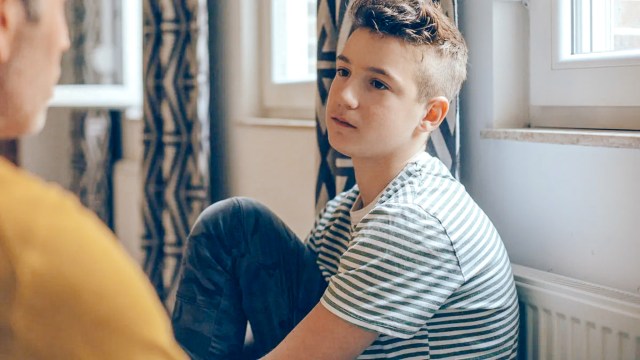If you’re a parent to boys, you might see a pretty major emotional shift happen at two main points: when they’re five and when they’re 15. Dr. Brendan Kwiatkowski, a doctor who specializes in boys’ and men’s social and emotional well-being, is explaining why in a viral TikTok video where he calls these points times of “boy crisis.”
“I want you to think about these ‘boy crises’ as significant time periods when boys get disconnected from authentic parts of themselves, usually their emotional parts,” he explains. “Prior to the age of five, boys tend to be more emotionally expressive than girls. However, that shifts around that time period, when boys become less verbally expressive than girls do.”
@remasculine Replying to @Kathie Rose Mashni here’s more detail on the two boy crises! (Thanks for being patient) let me know if you want to hear more. #masculinity #feminism #barbie #kenenough #positivemasculinity #teachersoftiktok
♬ Aesthetic – Tollan Kim
He explains that the somatic markers for emotion in boys’ brains don’t actually change—they just become less verbal. What that tells us is that boys don’t actually get less emotional around five years old, they just start suppressing their emotions at that age. Why? Well, Dr. Kwiatkowski says research indicates this is the age that boys start to become aware that two emotions in particular are less “socially acceptable” for them to express: fear and sadness.
“There’s lots of reasons for this,” he explains. “Some of it is due to implicit bias, as mothers and fathers tend to use less emotional language when talking to their sons as compared to their daughters, particularly about events that might be sad or scary. Some of it can also be much more intentional, though, as parents tend to be much more concerned about their sons being seen as too feminine than they are about their daughters being seen as too feminine” so parents police their sons’ emotions to protect them from bullying and judgment.
That’s why the first “boy crisis” coincides with starting school—it’s when boys are first exposed to social pressure, and when people are likely to begin policing their emotions.
The second “boy crisis” comes about a decade later, when kids transition to high school.
“You have puberty and all the insecurities that come along with that, you have changing social dynamics and trying to posture and fit in, and you also have the start of intimate relationships,” Dr. Kwiatkowski explains. It’s also when kids start to care more about what their peers think than what their parents think. He says many boys this age feel forced to wear a “mask of masculinity” to fit in, even if it doesn’t fit how they feel on the inside.
The good news? Boys grow out of these periods. But during these ages, they may need more emotional support. And it’s always good for parents to encourage them to be emotionally open to help them ride out the turbulence of growing up.











